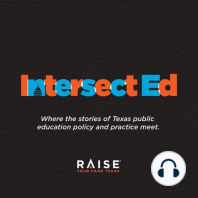14 min listen
The School Voucher Debate: Texas Rural Communities
FromIntersect Ed
ratings:
Length:
21 minutes
Released:
Apr 27, 2023
Format:
Podcast episode
Description
Morgan Smith: You're listening to the Raise Your Hand Texas Intersect Ed Podcast where the stories of public education policy and practice meet. I'm your host Morgan Smith, and today, we're taking on a topic that has become a marquee fight of the 88th Legislature, private school vouchers. On one side, we have our state's two most powerful elected officials, Governor Greg Abbott and Lieutenant Governor Dan Patrick, who say every parent should get the freedom to decide how to use taxpayer money in educating their children. On the other, we have every public education advocacy group in the state, including Raise Your Hand Texas, who say that vouchers will do nothing but harm students, teachers, and communities.To help us dive in today we have superintendent Randy Burks of the Hamlin Independent School District, and Bob Popinski, the senior director of policy at Raise Your Hand Texas. Dr. Burks and Bob Popinski, thank you both so much for being here. So first, let's define what we're talking about. There are a lot of different terms we might have heard to describe vouchers, school choice, education savings accounts, and tax credit scholarships. It gets even more confusing because school choice is also used to describe the array of options already available to Texas public school students, like charter schools and magnet programs.Right now, a plan known as an education savings account is what's gaining the most traction at the legislature. The basic gist is that the state gives parents a certain amount of money, $8,000 in Senate Bill 8, the main bill that we're watching, to use for our private school tuition or other educational expenses. On its face, maybe this doesn't seem like a bad idea. Bob, is this proposal, the education savings account, is this a voucher?Bob Popinski: Don't be fooled. No matter what they call them, whether it's an education savings account or a tax credit scholarship, or a virtual voucher, they're all the same thing. Vouchers are a scheme that’s used to divert public funds to private schools and vendors, and the keywords there are private schools and vendors, with no accountability, such as public schools have. And then they will continue to undermine traditional schools, including charter schools, in the future because those funds are taken from public schools to invest in our teachers, to invest in our students, and they're investing them into a program that has no accountability whatsoever. So it doesn't matter what you call them – education savings accounts, special education vouchers. They are bad public policy for the state of Texas.Morgan: Dr. Burks, your district is about 40 miles northwest of Abilene in Jones County, Texas. You've been a superintendent there for six years, though, you've worked in public education for more than four decades. Your district is rural and small, with just over 400 students and those students are primarily from economically disadvantaged backgrounds. Give us a little sense for your community. What are you most proud of there? What are you struggling with?Dr. Randy Burks: Well, Hamlin was what might commonly be referred to in some circles of school finances as a CTD district –“circling the drain district,” declining enrollment and loss of some industry that was here previously, and so the district has seen better days definitely. And the city itself is probably typical of a lot of rural Texas, crumbling infrastructure and substandard housing is pretty common here. And, you know, I grew up in a background that's not too different from a lot of our kiddos. And so I really felt like I had something to offer the school and the community because I had a background in school finance.So we moved to a collegiate model early on in my time here, because we just felt like that, so many of our kiddos were struggling with finding a pathway that would be better than the pathway that they could see. They couldn't really envision a better life than what their parents had. So, we're a P-
Released:
Apr 27, 2023
Format:
Podcast episode
Titles in the series (23)
Navigating a Pandemic: What's on Teachers' Minds?: This episode hosted by Raise Your Hand’s Victoria Wang, focuses on one key question: How has this been pandemic been affecting teachers’ mental health? Teachers have struggled to find a balance between their work and home life. They worry about their students and families. They ask themselves: Where are they? Why aren’t they responding? What are the scenes in every home? by Intersect Ed
